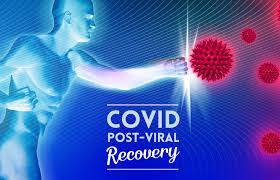- Post-Covid Syndrome Part 1 of 2
- Post-Covid Syndrome Part 2 of 2

Post-Covid Syndrome Part 2 of 2Organizations and governments have been slow to recognize this “long Covid”, so support groups have formed on Facebook and other platforms. The Body Politic group’s own researchers did a survey of 640 long-haulers that catalogued the full range of symptoms and explored the problems with stigma and testing.
Most long-haulers find it hard to get treated – their initial symptoms are so unlike the official description of Covid-19 that doctors often refuse to get them tested; employers don’t believe that they can be sick for that long; friends and family accuse them of being lazy; doctors refuse to believe they had Covid-19. “Medical gaslighting”, where physiological suffering is downplayed as a psychological problem, is especially bad for women, and even worse for women of color. The media attention on this issue since August of 2020 has reduced that, and has also led to several clinic and hospital programs that care for these patients, but many long-haulers still cannot find help. One long-hauler care program slowly reconditions a patient’s nervous system through careful exercises that do not trigger a debilitating crash, and also uses dietary support and relaxation techniques. Many long-haulers start to feel better in their fourth or fifth month, but recovery is variable and not guaranteed.
One university public health professor says that experts and officials should stop referring to all non-hospitalized Covid cases as “mild”. A definition of recovery from Covid-19 should go beyond being discharged from the hospital or testing negative for the virus, and account for the patient’s long-term quality of life. A bill has been introduced in Congress that would allow the National Institutes of Health to fund and coordinate more research into chronic illnesses that follow viral infections.
Terry Pfau DO, HMD
